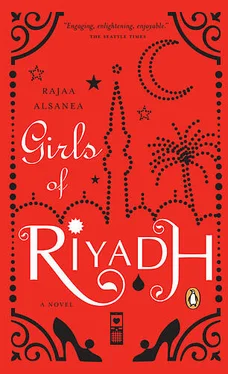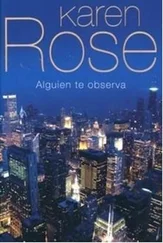Rajaa Alsanea - Girls of Riyadh
Здесь есть возможность читать онлайн «Rajaa Alsanea - Girls of Riyadh» весь текст электронной книги совершенно бесплатно (целиком полную версию без сокращений). В некоторых случаях можно слушать аудио, скачать через торрент в формате fb2 и присутствует краткое содержание. Жанр: Старинная литература, на английском языке. Описание произведения, (предисловие) а так же отзывы посетителей доступны на портале библиотеки ЛибКат.
- Название:Girls of Riyadh
- Автор:
- Жанр:
- Год:неизвестен
- ISBN:нет данных
- Рейтинг книги:3 / 5. Голосов: 1
-
Избранное:Добавить в избранное
- Отзывы:
-
Ваша оценка:
- 60
- 1
- 2
- 3
- 4
- 5
Girls of Riyadh: краткое содержание, описание и аннотация
Предлагаем к чтению аннотацию, описание, краткое содержание или предисловие (зависит от того, что написал сам автор книги «Girls of Riyadh»). Если вы не нашли необходимую информацию о книге — напишите в комментариях, мы постараемся отыскать её.
Girls of Riyadh — читать онлайн бесплатно полную книгу (весь текст) целиком
Ниже представлен текст книги, разбитый по страницам. Система сохранения места последней прочитанной страницы, позволяет с удобством читать онлайн бесплатно книгу «Girls of Riyadh», без необходимости каждый раз заново искать на чём Вы остановились. Поставьте закладку, и сможете в любой момент перейти на страницу, на которой закончили чтение.
Интервал:
Закладка:
Um Nuwayyir’s house still serves as a safe haven for the girls. The girls had their last meeting there during the New Year’s break when Lamees came from Canada and Michelle from Dubai to attend Sadeem and Tariq’s wedding. Sadeem insisted on having it in her father’s house in Riyadh. Um Nuwayyir planned the wedding with Gamrah.
As for love, it still might always struggle to come out into the light of day in Saudi Arabia. You can sense that in the sighs of bored men sitting alone at cafés, in the shining eyes of veiled women walking down the streets, in the phone lines that spring to life after midnight, and in the heartbroken songs and poems, too numerous to count, written by the victims of love unsanctioned by family, by tradition, by the city: Riyadh.
ACKNOWLEDGMENTS
I would like to express my deepest gratitude toward everyone who has helped me edit the English counterpart of my Arabic novel ( Banat Al-Riyadh ): my dear eldest brother Nasser, my best friend Aceel, my sister/ my rock Rasha and my wonderful editor at The Penguin Press in New York, Liza Darnton, who all tried their best so that my novel does not get lost in translation.
I would also like to express my deepest appreciation to my role model, Dr. Ghazi Al-Gosaibi, former Saudi ambassador to Britain, current minister of labor and brilliant poet and novelist, for his unflagging support.
Last but not least, I would like to remember the man who taught me how to write, my father, Abdullah Alsanea, may he rest in peace. I hope I would have made him proud.
GLOSSARY OF NAMES
The number 7 refers to an Arabic letter similar to the letter H in English. Arabs use numbers like 7, 3, 5, 6 to refer to certain Arabic letters that have no counterparts on an English keyboard. This is called the Internet language and is also used in cell phone text messages as well.
Seerehwenfadha7et:the name of the mail group created by the narrator. Seereh means memoirs or story; wenfadha7et, wenfadhahet means disclosed or exposed. The name was taken from a Lebanese talk show called Seereh Wenfatahet. It means “a story told” but the name got changed to wenfadhahet to reflect more of a scandalous scene.
I chose the characters’ last names to show where they come from. Just like any other place in the world, in Saudi Arabia you can tell a lot from where the man or the woman comes from.
P.S. Al means the.
Sadeem Al-Horaimli: of or relating to Horaimla, a city within Najd, the center of Saudi Arabia.
Gamrah Al-Qusmanji:of or relating to Qasim, a city within Najd, the center of Saudi Arabia.
Lamees and Tamadur Jeddawi:of or relating to Jeddah, a city within Hijaz, the west coast.
Mashael and Meshaal Al-Abdulrahman:a random name that can belong to any family with unknown roots (i.e., from an untraceable tribe).
Firas Al-Shargawi:of or relating to Sharqiyah, the east coast of Saudi Arabia.
The following family names are Arabic adjectives to describe the personality of each:
Rashid Al-Tanbal:the bonehead.
Faisal Al-Batran:the wellborn.
Waleed Al-Shari:the buyer, the purchaser.
Fadwa Al-Hasudi:she who hates to see other people more happy or successful than her.
Sultan Al-Internetti:of or relating to the Internet.
ABOUT THE AUTHOR
RAJAA ALSANEAgrew up in Riyadh, the younger of two daughters in a family of doctors and dentists. She is currently living in Chicago, where she is pursuing a degree in endodontics. She intends to return to Saudi Arabia after attaining her degree. She is twenty-five years old, and this is her first novel.
*A very popular cartoon for the 1990s generation of Saudi Arabian children. Translated from Japanese, it’s a story of a boy trying to achieve his dream of becoming a soccer star.
*An expensive car with completely tinted windows often belongs to a man who does not want his wife and daughters exposed to the eyes of young men looking for fun. Nowadays, tinting is prohibited by Saudi law for security reasons.
*The weekend in Saudi Arabia is Thursday and Friday.
*In Islam, a hijab is any kind of head covering that conceals the hair and neck of a woman.
*The hadith are collections of the sayings of the Prophet Mohammed.
*A famous Egyptian singer from the 1960s.
*The Internet provider company in Saudi Arabia.
*Sheikh Jassem Al-Mutawa’, a famous Kuwaiti Muslim televangelist who hosts a very well-known Arabic TV program called Happy Nests and is the chief editor of several magazines and the author of many Islamic books that discuss relationships between men and women, marriage and family matters.
*Among the different subclassifications of Saudi society, there are the tribals and the nontribals. Between those two classes/sectors there can be no marriages. A tribal family is one that can be traced to one of the well-known Arabic tribes.
*“Mama” can also be used as an expression to indicate surprise or fear (“Oh, God!”).
*Amr Khaled is an Egyptian Muslim activist and preacher. His popularity has now grown all over Arab countries. He is one of the most influential televangelists and authors in the Arab world.
**There is an Arabic proverb that says: “Better the shadow of a man than the shadow of a wall.”
*Manfooha is a very old and urban area south of Riyadh, and Olayya is a bustling area in Riyadh where real estate prices are high.
*After the death of Prophet Mohammed—peace be upon him—Muslims were split on who should lead them. Khalifah Abu Baker Al-Siddeeq, Prophet Mohammed’s loyal friend, was nominated, but there were those who rejected the choice and wanted Prophet Mohammed’s cousin and son-in-law, Ali Bin Abi-Taleb, to succeed. Shiite Muslims are of the opinion of the last group and thus are referred to by some Sunnis as rejectionists.
*Breakfast meal in Ramadan.
**A popular Ramadan drink; juice of grapes, raspberries and black currants.
***The call for prayer.
§The religious sheikh who calls for prayers at a mosque.
*A city in the east coast of Saudi Arabia, with a big Shiite population.
*Of course they do! All men who wear thobes have to wear long white underpants—called Sunni underpants—underneath to prevent the thin material of their thobes from shearing. The name “Sunni” underpants is just a funny coincidence.
*Arabic incense. Wooden sticks that come from particular trees in India or Cambodia, and when burned, generate strong and beautiful lasting fragrance.
**Al-Hai’ah is a short name for the Commission for the Promotion of Virtue and Prevention of Vice, i.e., the Religious Police.
* Yalla can mean “c’mon!” or “hurry up!”
*A short pilgrimage to Mecca undertaken by Muslims. Unlike Hajj, Umrah can be done anytime of the year.
*Due to their darker complexions, Saudi girls tend to have darkened knees. Guys always pick on girls because of that, although they have the same problem! However, due to the hot climate of Saudi, dryness and the frequent use of Arabic sandals, ni’aal, guys tend to have very dry feet and dirty toenails. Girls pick on that, in return.
*Egyptian actor. The line comes from a famous black-and-white “classic” Arabic movie.
*Anonymous last names to protect the identities of those bold enough to offer a writing job to me!
**Tahini halvah: a type of dessert made of sesame paste.
*A saying used when you compare two things that are both worthless.
Читать дальшеИнтервал:
Закладка:
Похожие книги на «Girls of Riyadh»
Представляем Вашему вниманию похожие книги на «Girls of Riyadh» списком для выбора. Мы отобрали схожую по названию и смыслу литературу в надежде предоставить читателям больше вариантов отыскать новые, интересные, ещё непрочитанные произведения.
Обсуждение, отзывы о книге «Girls of Riyadh» и просто собственные мнения читателей. Оставьте ваши комментарии, напишите, что Вы думаете о произведении, его смысле или главных героях. Укажите что конкретно понравилось, а что нет, и почему Вы так считаете.











